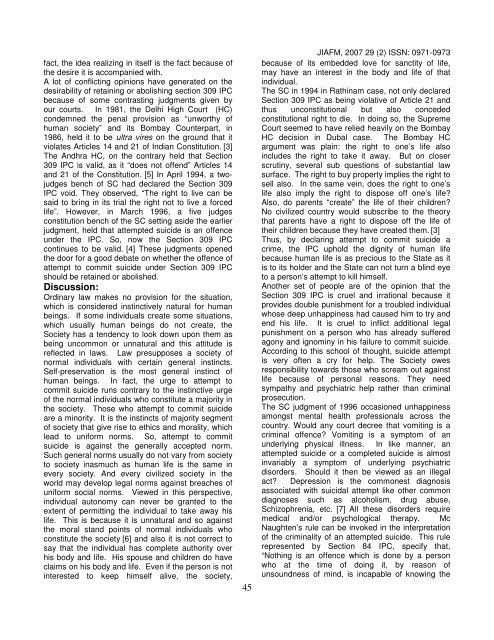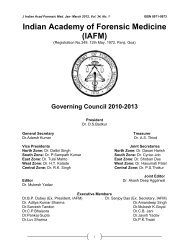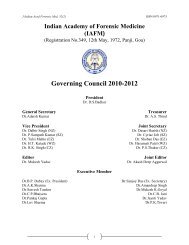Journal of Indian Academy of Forensic Medicine (JIAFM)
Journal of Indian Academy of Forensic Medicine (JIAFM)
Journal of Indian Academy of Forensic Medicine (JIAFM)
You also want an ePaper? Increase the reach of your titles
YUMPU automatically turns print PDFs into web optimized ePapers that Google loves.
fact, the idea realizing in itself is the fact because <strong>of</strong><br />
the desire it is accompanied with.<br />
A lot <strong>of</strong> conflicting opinions have generated on the<br />
desirability <strong>of</strong> retaining or abolishing section 309 IPC<br />
because <strong>of</strong> some contrasting judgments given by<br />
our courts. In 1981, the Delhi High Court (HC)<br />
condemned the penal provision as “unworthy <strong>of</strong><br />
human society” and its Bombay Counterpart, in<br />
1986, held it to be ultra vires on the ground that it<br />
violates Articles 14 and 21 <strong>of</strong> <strong>Indian</strong> Constitution. [3]<br />
The Andhra HC, on the contrary held that Section<br />
309 IPC is valid, as it “does not <strong>of</strong>fend” Articles 14<br />
and 21 <strong>of</strong> the Constitution. [5] In April 1994, a twojudges<br />
bench <strong>of</strong> SC had declared the Section 309<br />
IPC void. They observed, “The right to live can be<br />
said to bring in its trial the right not to live a forced<br />
life”. However, in March 1996, a five judges<br />
constitution bench <strong>of</strong> the SC setting aside the earlier<br />
judgment, held that attempted suicide is an <strong>of</strong>fence<br />
under the IPC. So, now the Section 309 IPC<br />
continues to be valid. [4] These judgments opened<br />
the door for a good debate on whether the <strong>of</strong>fence <strong>of</strong><br />
attempt to commit suicide under Section 309 IPC<br />
should be retained or abolished.<br />
Discussion:<br />
Ordinary law makes no provision for the situation,<br />
which is considered instinctively natural for human<br />
beings. If some individuals create some situations,<br />
which usually human beings do not create, the<br />
Society has a tendency to look down upon them as<br />
being uncommon or unnatural and this attitude is<br />
reflected in laws. Law presupposes a society <strong>of</strong><br />
normal individuals with certain general instincts.<br />
Self-preservation is the most general instinct <strong>of</strong><br />
human beings. In fact, the urge to attempt to<br />
commit suicide runs contrary to the instinctive urge<br />
<strong>of</strong> the normal individuals who constitute a majority in<br />
the society. Those who attempt to commit suicide<br />
are a minority. It is the instincts <strong>of</strong> majority segment<br />
<strong>of</strong> society that give rise to ethics and morality, which<br />
lead to uniform norms. So, attempt to commit<br />
suicide is against the generally accepted norm.<br />
Such general norms usually do not vary from society<br />
to society inasmuch as human life is the same in<br />
every society. And every civilized society in the<br />
world may develop legal norms against breaches <strong>of</strong><br />
uniform social norms. Viewed in this perspective,<br />
individual autonomy can never be granted to the<br />
extent <strong>of</strong> permitting the individual to take away his<br />
life. This is because it is unnatural and so against<br />
the moral stand points <strong>of</strong> normal individuals who<br />
constitute the society [6] and also it is not correct to<br />
say that the individual has complete authority over<br />
his body and life. His spouse and children do have<br />
claims on his body and life. Even if the person is not<br />
interested to keep himself alive, the society,<br />
45<br />
<strong>JIAFM</strong>, 2007 29 (2) ISSN: 0971-0973<br />
because <strong>of</strong> its embedded love for sanctity <strong>of</strong> life,<br />
may have an interest in the body and life <strong>of</strong> that<br />
individual.<br />
The SC in 1994 in Rathinam case, not only declared<br />
Section 309 IPC as being violative <strong>of</strong> Article 21 and<br />
thus unconstitutional but also conceded<br />
constitutional right to die. In doing so, the Supreme<br />
Court seemed to have relied heavily on the Bombay<br />
HC decision in Dubal case. The Bombay HC<br />
argument was plain: the right to one’s life also<br />
includes the right to take it away. But on closer<br />
scrutiny, several sub questions <strong>of</strong> substantial law<br />
surface. The right to buy property implies the right to<br />
sell also. In the same vein, does the right to one’s<br />
life also imply the right to dispose <strong>of</strong>f one’s life?<br />
Also, do parents “create” the life <strong>of</strong> their children?<br />
No civilized country would subscribe to the theory<br />
that parents have a right to dispose <strong>of</strong>f the life <strong>of</strong><br />
their children because they have created them. [3]<br />
Thus, by declaring attempt to commit suicide a<br />
crime, the IPC uphold the dignity <strong>of</strong> human life<br />
because human life is as precious to the State as it<br />
is to its holder and the State can not turn a blind eye<br />
to a person’s attempt to kill himself.<br />
Another set <strong>of</strong> people are <strong>of</strong> the opinion that the<br />
Section 309 IPC is cruel and irrational because it<br />
provides double punishment for a troubled individual<br />
whose deep unhappiness had caused him to try and<br />
end his life. It is cruel to inflict additional legal<br />
punishment on a person who has already suffered<br />
agony and ignominy in his failure to commit suicide.<br />
According to this school <strong>of</strong> thought, suicide attempt<br />
is very <strong>of</strong>ten a cry for help. The Society owes<br />
responsibility towards those who scream out against<br />
life because <strong>of</strong> personal reasons. They need<br />
sympathy and psychiatric help rather than criminal<br />
prosecution.<br />
The SC judgment <strong>of</strong> 1996 occasioned unhappiness<br />
amongst mental health pr<strong>of</strong>essionals across the<br />
country. Would any court decree that vomiting is a<br />
criminal <strong>of</strong>fence? Vomiting is a symptom <strong>of</strong> an<br />
underlying physical illness. In like manner, an<br />
attempted suicide or a completed suicide is almost<br />
invariably a symptom <strong>of</strong> underlying psychiatric<br />
disorders. Should it then be viewed as an illegal<br />
act? Depression is the commonest diagnosis<br />
associated with suicidal attempt like other common<br />
diagnoses such as alcoholism, drug abuse,<br />
Schizophrenia, etc. [7] All these disorders require<br />
medical and/or psychological therapy. Mc<br />
Naughten’s rule can be invoked in the interpretation<br />
<strong>of</strong> the criminality <strong>of</strong> an attempted suicide. This rule<br />
represented by Section 84 IPC, specify that,<br />
“Nothing is an <strong>of</strong>fence which is done by a person<br />
who at the time <strong>of</strong> doing it, by reason <strong>of</strong><br />
unsoundness <strong>of</strong> mind, is incapable <strong>of</strong> knowing the









